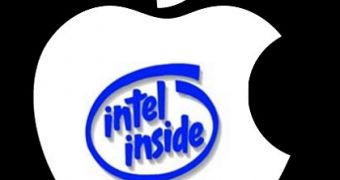Apple and Intel have walked the same path since early 2005, when the computer manufacturer agreed to include Intel's processors in the Mac product line. At that time, the news shocked the entire market, especially the PowerPC chip manufacturer IBM, who was enjoying Apple's whole attention.
Intel quickly took advantage of the new position and formed an internal department to help Apple engineers in developing Intel-related technologies. Intel has got beyond the Mac PC barrier and its processors are now used inside Apple's TV wireless set-top-box, such as a downclocked version of Intel Pentium M "Crofton" chip.
Of course, Intel is not fully satisfied with the current situation and is aiming at conquering another segment of Apple's business, the ultra-mobile PCs. Internal sources say that Apple is to become the largest supporter of Intel's new "Menlow" Mobile Internet Device (MID) platform. The upcoming 45-nanometer "Silverthorne" chip is alleged to be used by Apple in multiple products that will emerge the next year.
Intel's "Silverthorne" especially aims at cell phones, ultra-mobile PCs and other mobile internet devices, since it only takes up between half a watt and two watts. "The importance of the new Silverthorne chip is only comparable with the 8088 processor or Pentium," Intel chief executive Paul Otellini said in an interview. Moreover, he admitted that Intel is going to "deploy a whole product family of 45 nm Silverthorne chips in the near future aimed at capturing the top 10 to 20 percent of the cellphone market."
Both companies refused to disclose the exact applications Intel's processors will be used in, but rumor has it that the Silverthorne processors will be used in the second-generation 3G iPhone and in the Newton successor - the ultra-portable slate computer.
Apple's decision to stick with Intel's "Menlow" platform leaves room for speculations that the two companies are secretly shaking hands for a long-term relationship that will range beyond 2010, when Menlow's successor, the Moorestown, is slated to appear.

 14 DAY TRIAL //
14 DAY TRIAL //